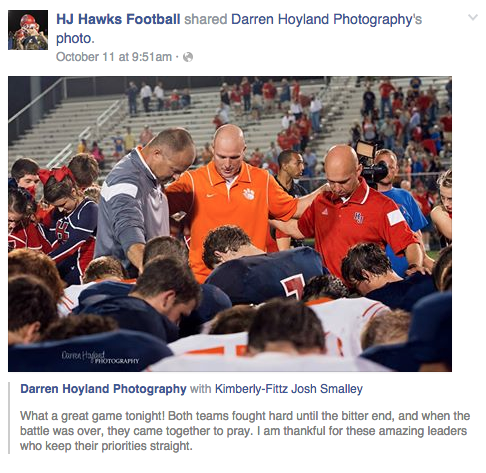Hemant Mehta's Blog, page 1895
October 22, 2014
Glad He Didn’t Respond to My Requests for an Interview
I don’t know how they did it, but the Onion News Network snagged an interview with the Almighty:
It went just as expected.
Why Are Atheists in the Military Still Denied This Valuable Resource?
It wasn’t until this past April when the U.S. military finally approved “Humanist” as an acceptable religious designation. But despite the number of non-religious members of the Armed Forces — a number that more-than-defies the canard of there being “no atheists in foxholes” — we have yet to see a single Humanist chaplain.
The Navy even rejected a highly-qualified Humanist applicant in May.
Ronit Y. Stahl, writing for Religion & Politics, has a fascinating history of the fight to get non-Christian chaplains in the military, specifically non-theistic ones:
A 2012 Pentagon survey found more than 13,000 atheist or agnostic personnel, along with 276,000 troops (nearly a fourth of all personnel) who claimed no religious preference — a proportion of whom may also be non-theist. Since 1993, the chaplaincy has welcomed Muslim, Hindu, and Buddhist chaplains, but Christians still comprise more than 90 percent of the current chaplain corps. For humanists, atheists, and their allies, the absence of any representative leaders within the chaplaincy remains a significant problem as it leaves them without any official support.
…
If there seems to be a stalemate about how to respond to the prospect of humanist and atheist chaplains, it’s because there is. But it’s clear that the experience of atheists and humanists in the military follows historic patterns of resistance and accommodation experienced by other minority and marginalized groups. And, unlike in previous eras, there is a significant and growing population of non-theists in the armed forces. Whether the chaplaincy extends its mottos of “unity without uniformity” and “cooperation without compromise” to include non-believers remains to be seen.
It’s absolutely unacceptable at this point for the military to deny this resource from non-theistic soldiers. If there were good reasons for it, at least we could tackle those arguments, but there aren’t. There’s just an aversion to change in the military, especially when it means opening the door to a group that’s not Christian. As Stahl’s article note, religious minorities with far fewer numbers eventually got their own chaplains; it’s about time we did, too.
(Thanks to Brian for the link)
A New Trend: Books About Atheism Focus on Life After Godlessness
In an article for Publishers Weekly, Henry L. Carrigan Jr. rounds up some of the recent/upcoming books about atheism with a sweeping (and welcome) summary: They represent a “shift from argument to lifestyle.”
In other words, they spend less time arguing that God doesn’t exist — the focus of the New Atheists’ bestsellers — and more time explaining what to do after you no longer believe in a Higher Power:
This guy seems pretty damn happy
Today various national surveys find some 30 percent of Americans identifying as atheists or secular humanists. With an increase of more than 200 percent in the past 25 years, this group — which sociologists of religion refer to as the “nones” — is the fastest-growing “religious” orientation in the country. How do these people lives fulfilling and meaningful lives without the traditional support of religious beliefs?
I love that shift in focus — we need more books helping atheists deal with things like raising kids, finding community, dealing with difficult times, etc. Those books are so much more practical than ones that make the case for why God doesn’t exist. Even if they appeal to a smaller segment of the atheist community, they’re invaluable for people who are seeking those resources but have nowhere else to turn.
As always, I’ll do my best to feature excerpts from some of the books mentioned in the piece on this site.
Fox News Host Says Christian Plaques at Two Texas Schools Should Stay Up Because of the “Culture in the South”
In August, we learned that Mountain Peak Elementary School and Longbranch Elementary School in Midlothian, Texas both
Dedicated in the year of our Lord 1997 to the education of God’s children and to their faithful teachers in the name of the Holy Christian Church
Soli Deo Gloria
After the Freedom From Religion Foundation sent a letter to district officials, they at least covered the signs up with duct tape while deciding their next steps, though the tape was quickly ripped down.
The school board met a month later and decided they would
This Texas School District Can’t Stop Promoting Christianity, Even at the Children’s Book Fair
I’ve been posting for weeks now about the numerous church/state violations taking place in Texas’ Hardin-Jefferson Independent School District.
Last we heard, district officials had finally taken some action by shutting down the China Elementary Facebook page. Which didn’t solve the underlying problems, but it was something, right?
Well, that page is back up and running and the violations in the district still haven’t stopped.
At a recent football game, both teams’ coaches joined the players in prayer:
It goes without saying at this point that that’s illegal.
And the elementary school is holding a book fair for the kids this week. Which sounds wonderful… until you realize that this is one of the display tables:
That picture is courtesy of a parent in the district who attended the fair.
I don’t see those items on the website for Scholastic’s elementary school book fairs…
(And considering Dr. Eben Alexander‘s debunked book is barely suitable for adults, I have no idea why anyone thinks it’s appropriate for children.)
I’ll ask again: How many violations does a district need to commit before they’re hit with a lawsuit?
Why Didn’t Jesus Lift a Finger To Stop His Deadbeat Oklahoma Wife From Going To Jail?
We’re all familiar with the notion that Jesus Christ will return to Earth. (Any day now.) Kristi Rhines just believed that the Savior, who happens to be her husband, would return really, really soon.
Police say Kristi Rhines told restaurant managers her husband was on his way to pick up the tab.
According to KSWO, Rhines told the managers she was legally married to Jesus Christ, but had no marriage license.
When police arrived, they confirmed Rhines had no way to pay for her alcoholic drinks or food. She was booked into the Lawton City Jail on a complaint of fraud.
Jail? But, but — freedom of religion! Deeply held beliefs!
I hope Jesus at least shows up with the bail money.
Reza Aslan: People Don’t Derive Their Values and Morals from Religion
Of the many head-scratching things Reza Aslan (below) has said over the past few weeks in his criticism of atheists like Sam Harris and Bill Maher who single out Islam as a uniquely troublesome faith, this may be the strangest:
I think the principle fallacy of not just to the so-called New Atheists, but I think of a lot of critics of religion, is that they believe that people derive their values, their morals, from their religion. That, as every scholar of religion in the world will tell you, is false.
People don’t derive their values from their religion — they bring their values to their religion. Which is why religions like Judaism, Hinduism, Christianity, [and] Islam, are experienced in such profound, wide diversity…
…
It seems like a logical viewpoint — if you are just a person who doesn’t know much about the history, philosophy, sociology of religion — it seems like a logical thing to say that people get their values from their scriptures. It’s just intrinsically false. That’s not what happens. People do not derive their values from their scriptures — they insert their values into their scriptures.
Basically, the only people who believe people derive value from their faith are those who have never studied religion.
Which is strange… since damn near all religious people I meet say they derive their values from their faith. (It’s the same reason they wonder how I, as an atheist, have any morals.)
Damon Linker at The Week pushes back on that claim by defending the New Atheists (whom he usually criticizes):
… at least [the New Atheists] take religion seriously — as a set of norms, practices, and beliefs that make and respond to truth-claims about morality, history, the fate of humanity, the meaning of life, and the nature of the universe. Aslan, by contrast, defends faith by denying it has much that’s distinctive to say about any of these matters — or rather that whatever it does say merely reflects and amplifies preexisting “cultural, nationalistic, ethnic, [and] political prejudices and preconceived notions.” On this view, religion and truth have little — if anything — to do with each other.
…
A sincere reckoning with religion — as well as an honest investigation of authentic atheism (life divested of all forms of providential thinking) — requires that we treat religious truth-claims with utmost seriousness, and that we examine them in their most potent, cogent, and compelling form.
The New Atheists fall far short of meeting that standard. But they come closer than would-be defenders of religion for whom the question of truth never even arises.
One of the main purposes of religion is to provide a framework from which we can live a fulfilling, meaningful life. To say that every religion is just an inkblot in a Rorschach test is to ignore the power that it has to shape those values in the first place. People become religious in part because they want that framework.
As Linker writes, atheists take religion seriously. We listen to what devout believers say. We see what’s written in the holy books. We don’t sugar coat it to make it more acceptable.
Aslan is willing to ignore all of that because, in his view, religions are all the same and what’s written in the holy books is irrelevant. That’s a dangerous way to think when some religions — and some believers who take the Words of God literally — pose real threats to society.
Here’s the different between the two views: I think we’d live in a better world if holy texts didn’t include passages that called for the death of those who didn’t follow God’s dictates. Aslan seems to think it doesn’t matter.
To paraphrase one commenter at NYMag.com, there’s a reason the Bible and Koran aren’t Choose Your Own Adventure books. They’re written with commandments and dictates, and they’re meant to be taken seriously. Aslan is foolish to pretend otherwise.
(via The Dish)
Bible Belt Christians Love Online Porn (Including Gay Porn); Why Google Is a Godsend To Religious Conservatives
In 2012, the New York Times published an article about strip clubs in Tampa. Business at the establishments boomed, the Times reported, when the National Republican Convention came to town, in ways that it didn’t when left-leaning conventioneers descended on the city. One strip club proprietor said daily revenue during the RNC gathering was three times that of the take during the Super Bowl, another high-grossing event for peddlers of sexual titillation.
You could still quibble over what those things meant. Republican convention-goers could simply have higher incomes than their counterparts on the left, making it easier for them to spend bigger bucks. Maybe Democrats and associated groups were just as interested in exotic dancing, but more reluctant to be seen indulging in activities that their political fellows may condemn as misogynistic.
Now, however, thanks to Canadian psychologists Cara MacInnis and Gordon Hodson, we have a scientifically sound look at the link between lustful interest in sexual imagery on the one hand (pardon the pun), and conservatism and religiosity on the other. The researchers published their paper in the peer-reviewed journal Archives of Sexual Behavior and titled it, straightforwardly, Do American States with More Religious or Conservative Populations Search More for Sexual Content on Google?
MacInnis and Hodson scrutinized Google porn-search data and found that, controlled for factors like population, income, and other variables, states where religiosity and conservative ideas are more prevalent also stand out in volume of porn searches.
From the abstract:
[W]e observed moderate-to-large positive associations between: (1) greater proportions of state-level religiosity and general web searching for sexual content and (2) greater proportions of state-level conservatism and image-specific searching for sex. These findings were interpreted in terms of the paradoxical hypothesis that a greater preponderance of right-leaning ideologies is associated with greater preoccupation with sexual content in private internet activity.
Both in 2011 and 2012, whose Google data sets MacInnis and Hodson studied,
… increased state religiosity was significantly associated with increased searches for sex, gay sex, porn, free porn, and gay porn.
The Washington Post plotted it on a handy chart:
Knowing a state’s proportion of conservative citizenry … is a very meaningful and strong predictor of the magnitude of searching for sexual images on the internet.
Some caveats apply, caution the researchers:
Our examination was limited to internet users, a very large but not complete sample of citizens. Further, our examination concerned religiosity/conservatism in the United States, a primarily Christian nation, with a highly polarized left–right political divide. It remains an open question whether similar associations exist outside of the American context.
One interesting clue to that question was offered when, eight years ago, Google Trend numbers began to reveal the enormous appetite for sexual images in Muslim countries – where, according to WikiIslam, sexual proclivities run the gamut from fairly vanilla sex acts to disturbing outlier stuff like bestiality and child porn. (Pakistan is reportedly number one in the world for “pig sex,” “dog sex,” “goat sex,” and “sexy children.”)
Wrote Andrew Sullivan at the time:
Who’s looking for “sex” the most? The countries with the most searches for that word is — surprise! — Pakistan, followed by Egypt, Iran, India, Indonesia, Saudi Arabia and Turkey. … Arabic is the most popular language for “sex” searches. Islamism, like Christianism, doesn’t conquer sex; it just fetishizes it and forces it underground.
Last year, Mother Jones noted that
[T]he highest number of hits for some of these terms, including “shemale sex,” come not from Pakistan’s cosmopolitan centers, but from Peshawar, a bastion of conservative Islam.
As for the Canadian team, its results are buttressed by a 2009 Harvard study that found a significant correlation between higher religiosity at the state level and the number of citizens who were known to have a paid subscription to a porn site.
Also, in March of this year, the leader in online sexytime, U.S. site Pornhub.com, released the following map, showing the lower 48 states and their populations’ interest in gay porn, specifically.
The majority of states with a high percentage of gay viewers is in the South, where gay marriage is illegal in all states. Dixie loves dicks so much, that the percentage of gay viewers for every single state in the South is higher than the average of the legal gay marriage states.
At number one, holding a record 5.58% gay users, is a state where, funny enough, butt sex is still illegal: Mississippi. Louisiana is closely on its rear at 5.44%, and Georgia with 5.38%.
In their 11-page paper, MacInnes and Hodson didn’t profess a whole lot of surprise over what they discovered:
Our findings… were congruent with the preoccupation hypothesis: although characterized by an outward and vocal opposition to sexual freedom, regions characterized by stronger political right orientations were relatively associated with a greater underlying attraction to sexual content. Employing a novel methodology and focusing on the relatively private and anonymous seeking of sexual content online, our results were in keeping with scientific research in related domains…
Collectively, these findings run counter to lay conceptions about political ideology and sexual behavior and represent interesting, meaningful, and frequently replicated associations. Such contradictions provide unique and valuable insights into human nature generally. For instance, consider the reliable, positive associations between religious identification, extrinsic religiosity, or fundamentalism and increased racial prejudice. … Clearly, people fail to ‘‘practice what they preach.’’
A “no shit” is in order.
(Top image via Shutterstock)
Arkansas High School Where Principal Asked Colleagues to Become “Prayer Warriors” with Her Now Has an Atheist Club
The City Wire‘s Ryan Saylor writes about the Secular Student Alliance group at Van Buren High School in Arkansas — the first of its kind in the state:
Sophomore Kieran Horne said the meetings would not focus on conversion of students or attempts at reinforcing belief systems, but instead would create a dialogue on a variety of topics.
…
The road for the three students to get the group up and running has not been entirely smooth, even though the three said turnout for the first meeting was beyond their expectations.
Horne said, “As expected, there was a lot of hostility. … It’s looked at as the atheist club, the anti-God sort of satanist group. But if they would actually read the posters that they tore down, they would see that isn’t the case.”
An individual close to the group who asked to not be named due to the controversy surrounding the organization said each of the posters the students posted on two different occasions were torn down prior to the first meeting this month.
I wish I could tell you this is an anomaly or just limited to Arkansas, but this reaction is fairly commonplace. Students seem to think that ripping down the promotional posters will make the club go away. It won’t. Even though the atheists are doing everything by the book and the administrators aren’t obstacles in their path, it’s the other students who try to intimidate those running the group.
It’s good to see the students here weren’t deterred. And it’s not surprising that had such great turnout for their first meetings. This is the sort of group that’s perfect for a high school, especially in the South, where many students may be exploring their religious beliefs for the first time and are eager for these sorts of discussions. They want to experience the kind of challenging conversations about faith that they rarely see in church, where everyone is simply expected to fall in line.
I hope the atheist leaders will maintain their calm no matter what religious students do or say. If they can, I’m certain the group will continue to thrive.
By the way, this is the same school where the principal once asked 20 employees to “become prayer warriors” with her, because “Satan is angry” and “We are under attack.”
They’ve come a long way.
Singing Nun Covers “Like a Virgin”
Sister Cristina Scuccia, a nun who won Season Two of the Italian version of The Voice this past June, just released the first video for her upcoming album… and it’s a cover of Madonna‘s “Like a Virgin.”
Well played, Sister…
If you think it’s a bit odd listening to a nun sing about her first sexual experience… well, you’re not alone. But Scuccia countered those criticisms by telling a newspaper:
“It’s a song about the ability of love to make people new. To redeem them from their past. And that’s how I wanted to interpret it.”
I guess we can all rejoice in the fact that this is a story about Catholicism and sex in which there are no victims. Hallelujah!
(Thanks to Scott for the link)
Hemant Mehta's Blog
- Hemant Mehta's profile
- 38 followers















